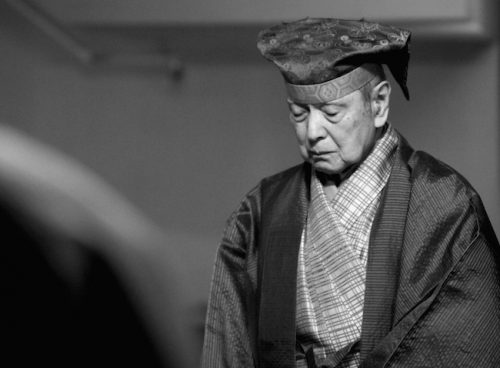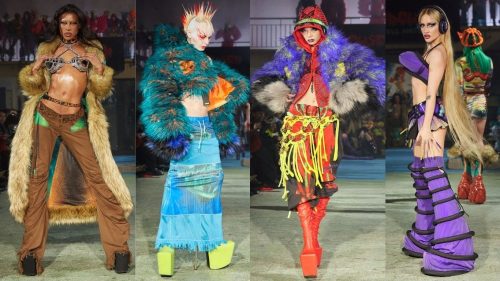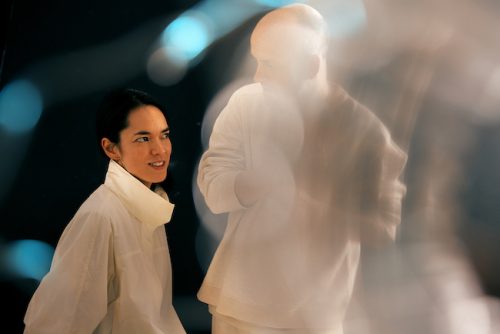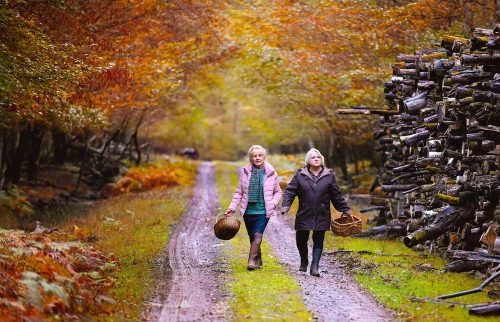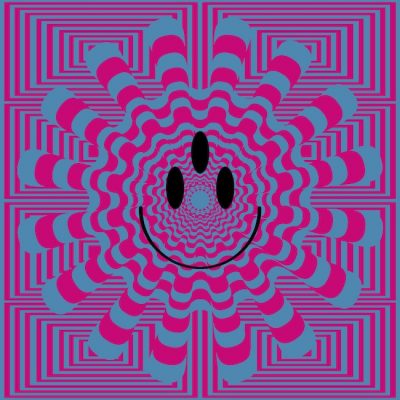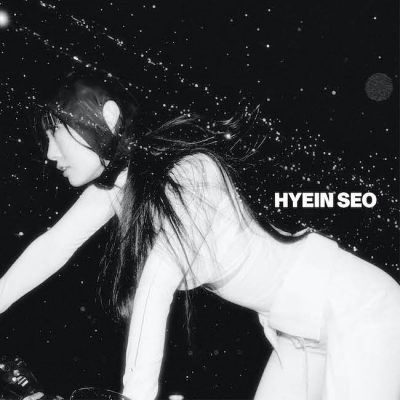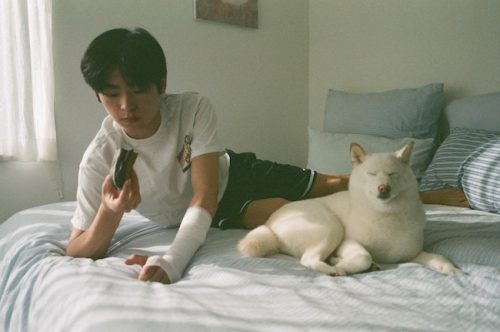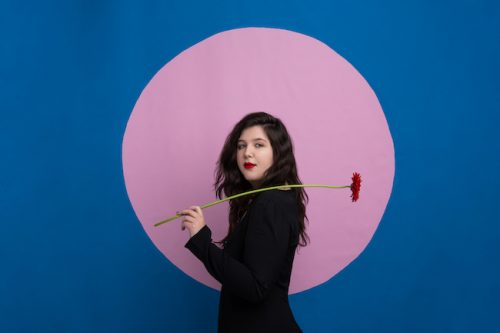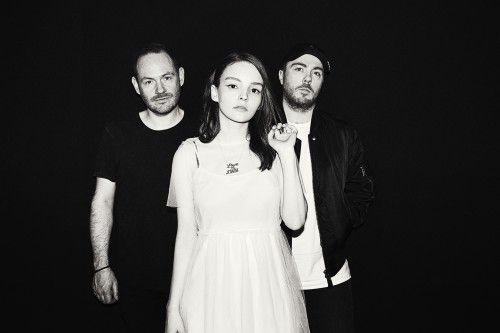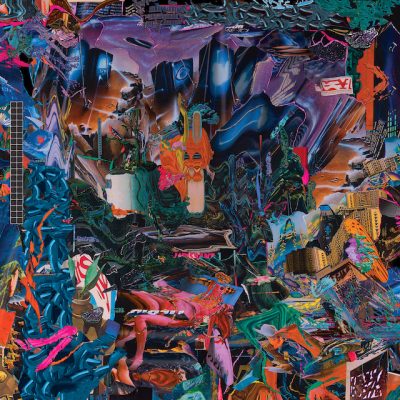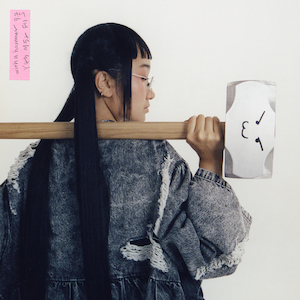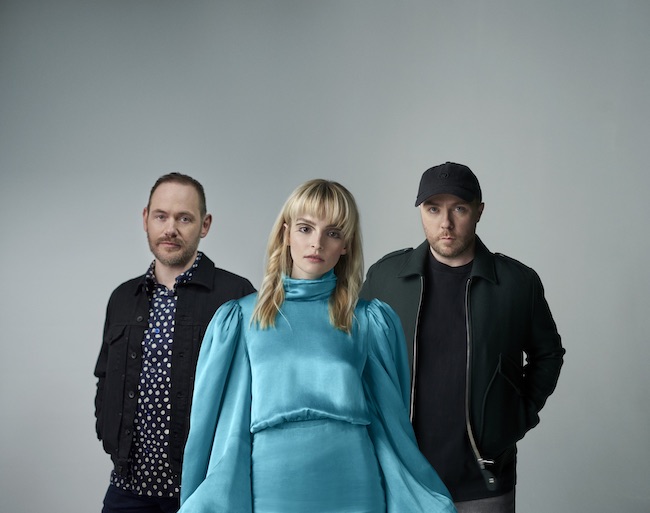
-The title of the new album, “Screen Violence” was originally a band name you came up with 10 year ago. In hindsight, the term “Screen Violence” seems to be a prophetic. It does explain the change in people’s attitudes and behavior in the past decade, and the state of society prompted by acceleration of digital technology. Do you remember how you came up with the name, or why you thought it would be a band name? The last time I talked to Lauren apparently it was Iain who wanted this name.
Lauren: I think it essentially was one of you guys. I don’t think it was me.
Martin: It’s not me.
Iain: Then it’s me.
Lauren: A lot of the names we were coming up with, we wanted something very visual, and parked back to the era of music we were referencing. At the end we didn’t choose Screen Violence was because it seemed too literal and we didn’t want people to feel the band was just an 80s pastiche. We all love that kind of horror aesthetic and those movies and the soundtracks from the movies as well. So it made a lot of sense.
It seemed like we could build a cool narrative or story around the record and the visuals. For me, lyrically, there is a lot to say about the term screen violence as well.
-Can you elaborate on the theme of this album? You mentioned that the theme of this album was about “On screen, by screens and through screens”. Here the term ‘screen’ refers to horror movies, cinema, television or even the internet and social media. As it connects people from marginalized communities, what made you focus on the violence aspect of it?
Lauren: Each of us recently rewatched the “Videodrome”, the David Cronenberg film and we were talking about how that film was made relatively long time ago.
What Cronenberg was seeing is still very relevant, it’s just a different screen we are talking about. Everybody used to think that movies and dumb tv were killing kid’s minds, and then it was video games. I think that there is a version of that for every decade and generation. We wanted to talk about that and personal stories and weave those narratives together to create all this imagery.
Martin: None of all these things were source of evil. Like digital media is not the problem.
Lauren: It’s the people
Iain: Yea
Martin: And people are not the problem either. It just the fear, the fear of the unknown. People are also afraid of young people. Many time it’s a technology that they don’t understand that rise to problems and that’s when older people offend the younger people. It’s an interesting stand point where we think games are the problem, violent films are the problem, social media is the problem. When in fact, its humanity and it’s a generational thing.
Lauren: I guess what has been fun for us, for me especially, was the lyrics. It’s not a concept record in terms of songs or stories about horror movies. It’s more about getting to tell personal stories in this specific landscape and through this lens. That was really fun for us. It was kind of freeing in a way because it took us into a new space.
-The lyrics you write, you start from a personal point of view, you mentioned that the songs in this album are also very personal. It is based on you on personal experience and honest emotions you felt then. Can you list the specific influences you had on your writing other than what you already mentioned?
Lauren: I feel like it was a transitional time for all of us and the band. For me personally, I knew I that I wanted to push myself out of my comfort zone in terms of writing. The people I really love who are Nick Cave and Jenny Louis who can write these stories. They know they are personal to them but they are a lot more narrative of what they are doing. They are not afraid to put in imagery. I wonder if it’s a imposter complex, but I always feel that I’m not a poet so why should I presume to write poetry in my songs. But once I stop being hard on myself and just try. It’s about trusting your band mates and trusting each other. If something was cringe worthy or terrible, they would tell me and we would figure out. It was nice to be able to support and encourage each other to try different things. It was helpful especially after three albums to change your mindset a little bit, so you aren’t doing the same things over and over again. I find that very freeing.
-In 2013 Lauren, you wrote an open letter to the Guardian expressing an opinion about sexism on social media. As a precursor on the #MeToo and #TimesUp movement on social media, 8 years later, it is still as relevant and an important statement. I imagine, this has put you in a unexpected position, as a speaker and representative, therefore given immense responsibility. Sometimes more than necessary. In recent years pop stars, artists and entertainers are expected to respond on certain issues. How do you think it impacts on the creativity or expression?
Lauren: I think it’s interesting on this new record that, for the first time, we wrote about gender or our feelings that happened throughout our career. So much have been written about gender, feminism, the interenet. It’s a self-fulfilling prophecy. Your experience as a person is forged by what you do in the world that you live in. My career is forged by me being a female, what I write is forged by my life experience. So people are constantly reminding you of the things all the time. It was a self-fufuilling prophecy, eventually I was going to write about it. I didn’t write about it before. It was three albums of people talking to me to write about it and telling me what was right and what was wrong. So it’s the first time we addressed it and it was awesome to see how people respond to the songs. We didn’t go into writing message songs, they are just personal perspectives. And it’s been very humbling and reassuring to see that resonate with people. As much as I’m cynical about how much the media and society have changed, whether they are covering their backs and doing whats on trend, I believe if we release “He said She Said” and “Good Girl” two years ago, the backlash from the media and male journalists would have been way worse. But you can’t get away with that the same way anymore. It’s interesting and I’m glad that we had strengths in our convictions and had integrity about those things. I think now its certainly hard to not get dissolutioned or tired. I have to focus quite hard to not feeling embittered about those things. Especially when you see it become a trend and more people talking about it. It’s hard to know whether that is because people feel safer to use the platforms to say those things, or whether they are saying those things because it’s easier so they can actually say what they think. I have a tiny cloud of rage, I’m like where were you when the chicks were there and you were nowhere. But now you are wearing a #feminism t-shirt we are all supposed to be happy. But I don’t know how it will end and the road is long ahead.
-Which song on this album was the most significant one to each of you and why?
Iain: I think the one that is most significant to me is “How not to Drawn” . The one with Robert Smith. The very first moment I heard the demo that Martin did, immediately I was like that song got something really unique and really powerful. The more that we worked together, obviously the icing on the cake was Robert Smith, it kept levelling up and elevating it. Just to me I think it’s the best thing that we have ever done as a band. I’m so proud of it.
Martin: I think the one that is most significant to me is “Better If You Don’t”. Just because I’m feeling very homesick right now.
Lauren: Me too, what’s happened?
Martin: The song reminds me of Glasgow. The guitar on the demo ended up staying on the song. I like that. It reminds me of my playing style when I first played the guitar when I was young. I played sad chords on the guitar and having developed into a musician years later, reconnecting back to that style. With a different relationship with music and different relationship with melody, using the very simple building blocks. To me it’s nice to see it ended up on the album.
Lauren: I think my favourite one is “Asking For A Friend” which is the track that opens the record. Just cause it feels like a Cathartic song to me. Lyrically it’s about things you regret, things you wished had been different or wished that you’ve done differently. It’s about holding on to things you do care about and what you do matters. There is lyrics that is about Glasgow as well. The song doesn’t have verses, but there is a line in it that “The mess we made on Fridays gave me Sunday on my knees” it was about the messy weekends we used to have and you would make terrible mistakes. Either your on your knees on Sundays because you are at church or you don’t believe in or you are in a two day hangover.
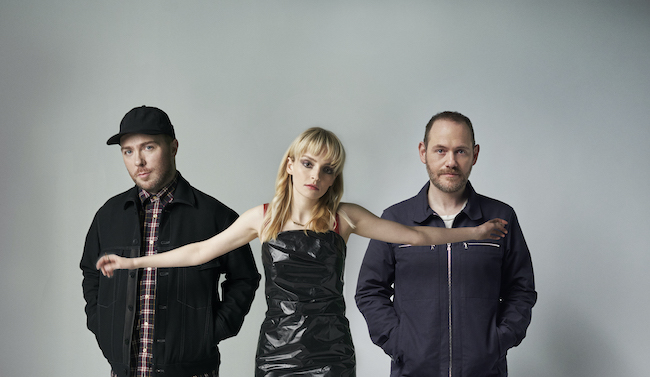
-According to the Guardian article, you drew inspiration from the Depeche Mode, The Cure, Brian Eno for writing this album. What kind of ideas or concepts did you have for the sounds in the album?
Iain: I don’t think we really set out with any specific ideas or influences or refences points. As usual with this band, it grows organically. All of these influenes plus many more have always been hanging around in the creative cloud of this band. I guess some of them rise to the surface while others don’t. Certainly we didn’t discuss any big ideas or things that was going to be different this time.
Martin: To me the difference is how we evolve as musicians over the years. Therefore influences would be there wether I was in a heavy metal band or whether I was in Chvrches. I’m not sure if that concisiously seeps into what we do, it probably does in a subconscious level. But the types of exploration that I do on what is exciting to me and the studio. Quite often we use techniques and new ways of learning. These have a huge influence on me as a musician and they find their way on the album. So like all these old things, like The Cure and Brian Eno, they form a big bubble. They are in the bubble but we change and they don’t change. But sometimes new things come into the bubble, some things evaporate. It’s more about how we evolve than anything else.
-In your last album, “Love Is Dead”, Greg Kurstin and Steve Mac were brought in as co-producers. Production of mainstream pop music including hip hop influence, was a point of reference in the last album. In our previous interview, during your promo visit three years ago, it seemed to us that Iain and Martin were excited about the new approach. Lauren was more focused on what you wanted to express in your personal taste. What was your personal approach to the sound of this album?
Lauren: Maybe that’s because of the division of labor in the band and who does what. I don’t know much about production to be honest. I don’t make any of the instrumentation, that’s all Iain and Martin. I guessed you picked up on how we play a different role, in the process. I think the only brief I can give myself is that I needed to dig a bit deeper and try something a bit different. Just allowing yourself to try different things and not worry about if it doesn’t sound like the last record. I feel like that’s where you get lost inside your head with too many restrictions in your head. I think we had a title to start with, which we never had before. So, it was a fun exploration.
-In the same interview with the Guardian, the vocal production of the Billie Eilish album is absolutely phenomenal and that is another advancement in pop music. You also mentioned that there are things you should learn, like production tricks, and there are things you shouldn’t learn as well. Since this album is written for self-production, I would like to ask about the influences of the evolution of pop music sounds in the album. In doing so how did you draw the line between pop music influence and the production of this album?
Lauren: The Billie Eilish quote on the article was a misquote, there was more to the front of that. People were asking how the talk on music affects how you guys make things. I said that there is a lot of things to be admired but that’s not necessarily the direction we should be narrating with. Then it got confused and I saw some news go, “Chvrches going to make album that sounds like Billie Eilish”. That’s not what I was trying to say. But yes, I will defer to the guys.
Martin: I don’t, and I don’t think anyone should draw a line between genres or tastes or how one thing ends, and another starts. As humans, listeners, appreciators we subconsciously go on board and have favorites. I learn just as much from music that I hate and the music that I like. These are all miniature lessons that you can soak up if your mind is open.
-“He Said She Said” has this impressive vocal processing and electronic productions. The song “Nightmares” has frantic melody, a dynamic buildup and a drop. We can hear the characteristics and styles of these songs shared by Hyper Pop, Glitch Core music. As a listener have you been exposed to that category of music?
Martin: Yes, is the short answer. I have actually worked with A.G. Cook in the past. He is a very nice man and he approached us after “He Said She Said” came out. He said to me in the studio “Oh, I really like He Said She Said” and made sort of a knowing smile towards me. I told him that I really like PC music smiling back. That was a fun moment. It’s healthy to be influenced by modern things too.
Iain: I think it’s not about who you are influenced by, it’s about how you synthesize those influences based on your taste. It makes original music.
Martin: We don’t decide that today we make music like the Beatles. But if we listen to Beatles music for a week, there is a good chance there is some sort of influence in that. I was probably listening to PC music, and pop too that A.G. Cook produced most of it. I was also listening to Charli and Cristine the song they did together.
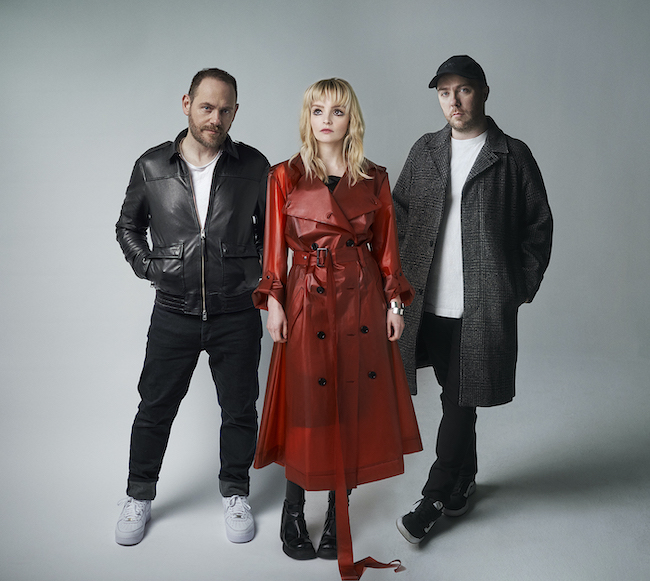
-About this album, Lauren you said, “It definitely got the Chvrches DNA, but I don’t think that these songs could slot into any of the first three records”. For you guys, what makes this album different from the previous ones and what makes it special? It would be ten years since you formed the band. To the band’s history, how significant would this album be?
Martin: I guess it’s not for me to differentiate. When I go back to the earlier material, maybe the second album, I hear the beginnings of the band that we became. Every album we made was just a stage of evolution to where we are now. In a lot of ways, I feel like we were going to be in this band we are today. But in order to get there we have to do all the research and development. It’s several months of work, a lot of listening, learning. In the back of mind when I look back, some things make perfect sense, everything is part of the journey. And it does make it unique. Many of the songs can be broken down into the piano. It could have existed on the previous albums. Because the core is in the songwriting. I think that’s what makes it unique.
There is definitely a line that runs through the band’s career.
Lauren: I feel like I agree with that. Also, I think what we feel about the record is probably changed from that interview. That interview was in December 2020 and it was like the first interview of this whole cycle. I feel like I reflect and connect differently to a record when a lot of time has passed. In the media aftermath, it’s so fresh and you see things a bit differently after a certain amount of time. It’s also weird how we are promoting this record, but we are already working on new music so it’s interesting to talk about an album with a bit distance between its which really haven’t happened before. We’ve just finished a record and we promote it right away. It’s so fresh emotionally in both good and bad ways.
Martin: That’s absolutely true. I didn’t even know that the greater distance you have from a piece of work, the more it starts to look differently. Sometimes it reveals new things you love
Iain: Yea, I think we all have a different perspective on the albums when we start touring with the songs. We are playing them every night and that always have a big change with the relationship with your songs and work. Especially when you constantly see how people react to your work, face to face, in terms of an audience, it sometimes confirms your feelings or changes them in a way.
photography Sebastian Mlynarski/ Kevin J Thomson
text Junnosuke Amai
